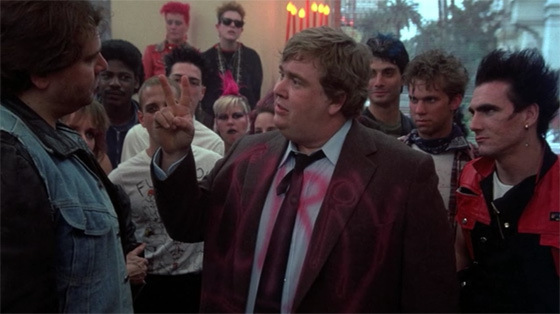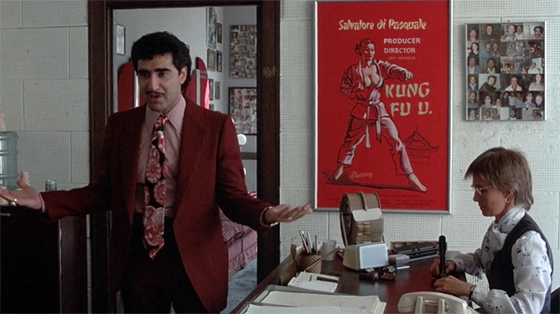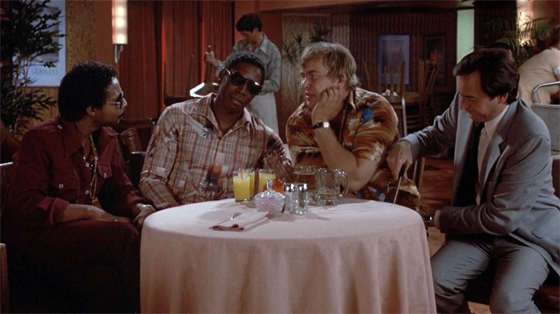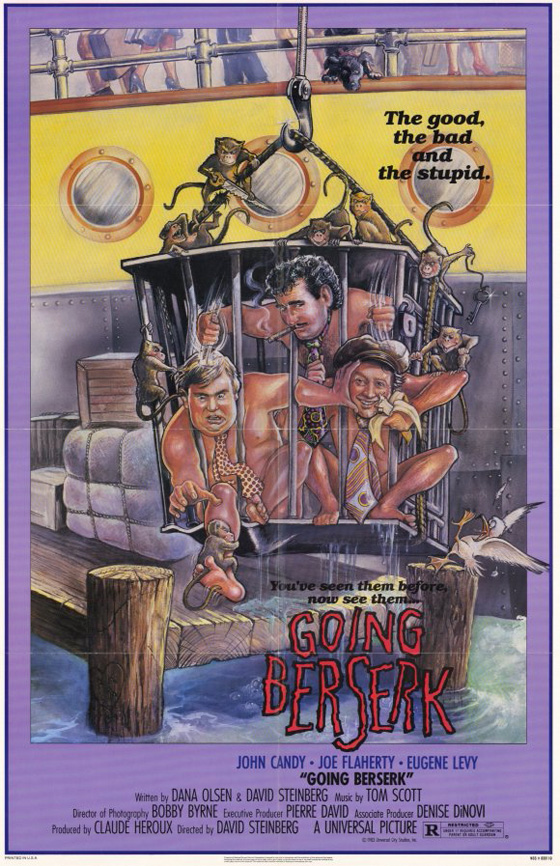
Going Berserk (1983) has one good idea going for it: to cast SCTV‘s John Candy, Eugene Levy, and Joe Flaherty, all of them rarely unfunny in whatever they do. But perhaps they should have written the script as well. Ripe comic situations are set up and abandoned, gag-free. The actors pitch their performances at the broadest level of screwball, but the gestures go unrewarded. Still…if you need to explain to somebody what the 1980’s were, you can just show them Going Berserk, which begins with an opening title sequence that illustrates the film’s story in crude, non-animated drawings and painful early 80’s rap, Comedy Bang Bang-style:
Well John’s the lead in this meaty scene
He’s the Candyman, if you know what I mean
And he drives a long black limousine
With his sidekick Chick [car horn sound]
Now John’s the drummer out in the street
But the man can’t even keep a beat
So he spins his wheels to make ends meet
You got it? [Girl’s voice: “Huh?”] Stay with me now!
John’s got a pretty little fiancé
When her daddy’s trying to pull a power play
And if Big Daddy gets his way
Our man John will be wearing seaman’s shooooooes!

Eugene Levy as the sleazy Sal Di Pasquale. Note the poster for his film "Kung Fu U."
So that’s the plot, if there is one. Candy also has to contend with an aerobics cult led by the Reverend Sun Yi Day (ubiquitous character actor Richard Libertini), who, with his beautiful sidekick (Designing Women‘s Delta Burke), schemes to hypnotize Candy, Manchurian Candidate-style, into assassinating the governor whose daughter Candy is marrying. But the plot is the flimsiest of excuses for one sketch after another, a few of them in the style of SCTV film parodies: the badly-dubbed martial arts film Kung Fu U., a dream sequence which evokes The Blue Lagoon, and a sadistic spoof of Leave it to Beaver. The majority of the film, however, wants to be more Marx Brothers than Kentucky Fried Movie; at least, I assume that was the aim of writer/director David Steinberg, a stand-up comic and prolific director of TV comedy (most recently for Curb Your Enthusiasm), who once had his own short-lived Canadian series, The David Steinberg Show, that featured Candy, Flaherty, and other future SCTV stars. I can admire the intentions. Some of the gags do work, including an extended digression involving a pre-Ghostbusters Ernie Hudson as a convict who “set fire to his family.” For unconvincing reasons, Candy becomes handcuffed to Hudson and they go on the lam, paying a visit to Hudson’s ex-girlfriend. Candy delivers some nice physical comedy as he stands in the apartment building’s hallway while still handcuffed to Hudson, who has violent sex on the other side of the door, an activity that doesn’t stop the amicable Candy from offering to hold some bags of groceries for a neighbor. When Hudson dies of a heart attack, Steinberg stages two very brief scenes which condense all of the laughs of Weekend at Bernie’s into the space of about three minutes. Shot one: Candy in a phone booth, still cuffed to the corpse lying conspicuously outside. Shot two: Candy in a fancy restaurant, Flaherty applying a large hacksaw to the cuffs while an oblivious fellow carries on a one-sided conversation with Hudson; when Hudson’s head falls limply backward, his friend simply looks up and says, “Whatcha’ lookin’ at, bro?” (Even more Bernie’s-esque, the ending credits find the pair taking a vacation at the beach, the conversation continuing.)

"Going Berserk" predicts "Weekend at Bernie's," but effectively keeps the gag down to about three minutes.
For the most part, however, Going Berserk is strangely lacking in laughs. It’s more interesting as a byproduct of the Canadian comic invasion that began in the 70’s and made its full pop-cultural impact in the 80’s. Though SCTV remained a mere cult hit, never quite rising to the mainstream, its stars quickly became familiar faces in 80’s comedies. Going Berserk is one of the first steps in that shift from Canadian television to Hollywood, and an early attempt at designing a John Candy vehicle. Candy, who had already appeared in 1941 (1979), The Blues Brothers (1980), and Stripes (1981), was on his way to stardom with Splash (1984) opposite Tom Hanks; from there he would become an 80’s comedy fixture: Brewster’s Millions (1985), Summer Rental (1985), Volunteers (1985), Armed and Dangerous (1986), Spaceballs (1987), Planes, Trains, & Automobiles (1987), The Great Outdoors (1988)…Hollywood had found a new comic star and had no trouble exploiting his talent. And that talent and charm is very much in evidence in Going Berserk, even if the film can’t live up to it: just watch the scene where the hypnotized Candy humiliates his fiancé by taking to the stage with a microphone, talking of his girl’s sexual prowess as though it were the most sensitive and moving of dedications. He ends his speech with: “This song goes out to you, honey. It’s called ‘Me and My Dick.’ Help me out, because this is a special song. I’m going to sing with my dick. In my hand. For you, honey.” (His fiancé simply holds out a Mastercard to the waiter.) Watch the sincerity in Candy’s face as he delivers his speech, effortlessly pushing past the material’s feeble potential, and it’s no wonder that he was only a year away from being a household name. Still, by this point in time the film’s confusingly-designed poster could only half-heartedly mention the fact that these faces will be somewhat familiar to you: “You’ve seen them before, now see them Going Berserk.” Yes, and thankfully you’ll see them again.










